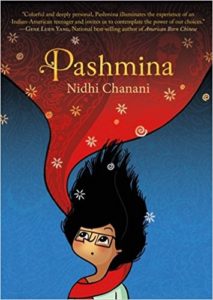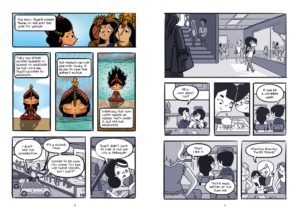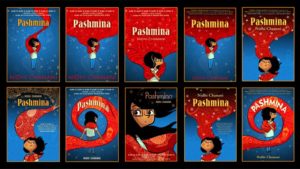“Pashmina” by Nidhi Chanani
 Pashmina by Nidhi Chanani is a graphic novel about a young Indian-American teenager Priyanka, growing up in America, where she lives alone with her mother. She has plenty of questions about India and her father. Her mother gives her information as and when she feels it necessary otherwise manages to evade them. One day at home she discovers a Pashmina shawl, beautifully embroidered. It falls out of the cupboard. Priyanka is enthralled by its beauty and wraps it around herself. When she does her world transforms and she is transported magically to a different world, represented colourfully in the plates which are otherwise black and white. These magical interludes in her life only strengthen Priyanka’s resolve to visit
Pashmina by Nidhi Chanani is a graphic novel about a young Indian-American teenager Priyanka, growing up in America, where she lives alone with her mother. She has plenty of questions about India and her father. Her mother gives her information as and when she feels it necessary otherwise manages to evade them. One day at home she discovers a Pashmina shawl, beautifully embroidered. It falls out of the cupboard. Priyanka is enthralled by its beauty and wraps it around herself. When she does her world transforms and she is transported magically to a different world, represented colourfully in the plates which are otherwise black and white. These magical interludes in her life only strengthen Priyanka’s resolve to visit India and find out more about her roots. Despite her mother’s resistance she is able to book a flight to India by using the prize money she won at an art competition. While in India she discovers the truth about her identity, her mother’s decision to migrate and the history behind the shawl.
India and find out more about her roots. Despite her mother’s resistance she is able to book a flight to India by using the prize money she won at an art competition. While in India she discovers the truth about her identity, her mother’s decision to migrate and the history behind the shawl.
Pashmina is a beautiful coming-of-age story much like the desilit of nearly two decades that had suddenly become popular except in this case the format is graphic, a generally more acceptable form of storytelling nowadays. Having said that there is a statement on the glossary page saying “Traditionally, the term ‘pashmina’ is associated with shawls that are made from very fine Kashmiri wool. However, in this book, pashmina refers to the embroidered silk shawls that are woven in Nagpur, Maharashtra. ” Even though this clarification has been printed in the book it is misleading to have an entire story which is ostensibly set in America and western Indian state of Maharashtra to have the shawl and its title taken from the state of Kashmir, which is in the north. It may not be confusing for those unfamiliar with India, for whom the exoticism of this story will be appealing rather than the details but it is unfair to stretch the creative license of storytelling to transplant the handloom unique to a state to a different region. Handlooms and handicrafts are unique to every region and representative of the cultural identity of the state. It is also an identity that the artisans and others working in this sector for the preservation of handicrafts strive for — particularly in registering Geographical Indicators (GIs)under the TRIPS Act. So books like Pashmina while creating awareness indirectly about the beautiful shawls also cause damage by blurring regional identities in the minds of people who will ultimately be counted upon preserving handlooms. While writing for children and young adults, of impressionable minds, it is imperative that facts are checked, even if the story is purely fictional.
 This book has been whispered about and discussed for a while now and its production quality has not disappointed one at all. In fact there is a lovely essay available online by the cover designer on the many avatars his designing underwent before the team selected the final layout.
This book has been whispered about and discussed for a while now and its production quality has not disappointed one at all. In fact there is a lovely essay available online by the cover designer on the many avatars his designing underwent before the team selected the final layout.
Be that as it may despite the reservations about the mixed regional identity of the handloom, Pashmina is a lovely introduction to the community of Indian-Americans and the possible questions of identity that plague the younger generations. It is wonderfully represented in the storyline and the artwork. Well worth reading!
Nidhi Chanani Pashmina HarperCollins Children’s Books, an imprint of HarperCollins Publishers, Noida, 2018. Pb. pp. 170 Rs 399
5 May 2018
*Note: All images are off the Internet. If you own the copyright to them please let me know and I will acknowledge it.

1 Comment
cashmere pashmina
about 5 years agoGreat post.